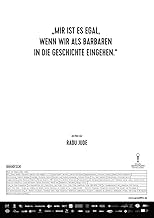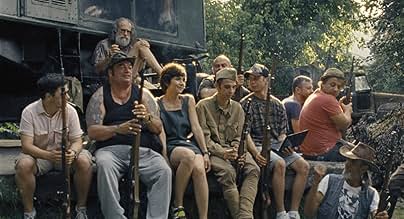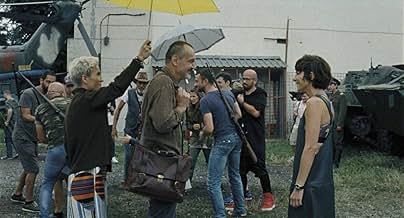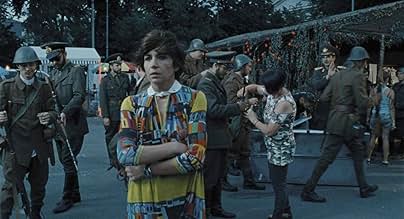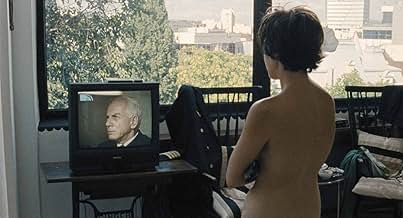Eu não me Importo se Entrarmos para a História como Bárbaros
Título original: Îmi este indiferent daca în istorie vom intra ca barbari
- 2018
- 2 h 20 min
AVALIAÇÃO DA IMDb
7,2/10
2,2 mil
SUA AVALIAÇÃO
Adicionar um enredo no seu idiomaAn artist commissioned to stage a re-enactment of a Romanian war battle receives pushback from producers for including a realistic portrayal of her country's treatment of Jews during WWII.An artist commissioned to stage a re-enactment of a Romanian war battle receives pushback from producers for including a realistic portrayal of her country's treatment of Jews during WWII.An artist commissioned to stage a re-enactment of a Romanian war battle receives pushback from producers for including a realistic portrayal of her country's treatment of Jews during WWII.
- Direção
- Roteirista
- Artistas
- Prêmios
- 11 vitórias e 18 indicações no total
Avaliações em destaque
An incredible movie about the difficulties of every nation to face its ghosts and to assume its history and eventually its identity.
I saw the movie at the Seattle Film Festival. The subject matter is relevant and intriguing from a social point of view - so the movie had the potential of being poignant and thought provoking. Instead, it feels as if the editor had been AWOL. The first hour and a half of the movie is peppered with irrelevant scenes, gratuitous coarse "humor" that is neither here nor there, and static shots with noise in the background (not unlike the time I accidentally hit record while pointing at the floor). Had it been a topic that I didn't have a personal interest in, I would have walked out of the theater after the first hour.
Surprisingly, the movie does end strongly. A good editing job could probably do wonders, producing a good 1 hour long movie. And that, in my book, would be preferable.
Surprisingly, the movie does end strongly. A good editing job could probably do wonders, producing a good 1 hour long movie. And that, in my book, would be preferable.
Mariana wants to direct a street show for the public depicting Romania's hand in the genocide of Romanian Jews during WWII. Her mentor and backer questions whether it is necessary, and maybe play up the heroics of the Romanian army in the war. That is the gist of the movie with the enormously long title.
The question is, why such a controversial theme? The Holocaust as illustrated in this picture will not play well here in a city with the largest Jewish population in the country. There is no question the Romanians have mastered the art of filmmaking; in fact, Lincoln Center hosted a Romanian Film Festival a few years ago. Noteworthy in this picture is an interesting back-and-forth between the two principals as they argue the philosophical and ethical pros and cons of the show, with some interesting historical references. As always, the actors are very natural and their competence is a feature of Romanian films.
It is worth your time and the ending packs an unexpected punch. It is not for everybody but it is the type of superior filmmaking you can expect in Romanian films.
7/10 - Website no longer prints my star rating.
The question is, why such a controversial theme? The Holocaust as illustrated in this picture will not play well here in a city with the largest Jewish population in the country. There is no question the Romanians have mastered the art of filmmaking; in fact, Lincoln Center hosted a Romanian Film Festival a few years ago. Noteworthy in this picture is an interesting back-and-forth between the two principals as they argue the philosophical and ethical pros and cons of the show, with some interesting historical references. As always, the actors are very natural and their competence is a feature of Romanian films.
It is worth your time and the ending packs an unexpected punch. It is not for everybody but it is the type of superior filmmaking you can expect in Romanian films.
7/10 - Website no longer prints my star rating.
This film is a great feat, with a universal message regarding the difficulty in facing our true national images in the mirror, including savage, murderous episodes. Exquisite acting and art, as well as nuanced irony neatly combined with grave philosophising and serious storytelling. I was glued to the screen for the entire 2 hours and 20 minutes.
I have seen today together with other several hundred of spectators Radu Jude's most recent film, "I Do Not Care If We Go Down in History as Barbarians" at the Haifa Film Festival. A film that courageously and blutly addresses the theme of knowing and assuming the historical past in the Romanian society of today. A movie that will have an impact and will spark controversy, but I am convinced that this is exactly what the filmmakers intended.
Every people I know builds its own historical image, its own mythology. These are based in part on historical facts but viewed from their own perspective and beautified on a voluntary basis (to mobilize and unite 'nations' in times of crisis or for diversionist and propagandistic purposes) or involuntarily. Very few nations that I know have had and only at certain times of their history the lucidity of recognizing their mistakes, of contradicting their mythologies and of rectifying their own historical image to accept the mistakes and sometimes even the crimes committed by governments and the leaders they had chosen or accepted to represent them. Knowing and accepting your own history is a process that varies from country to country, from people to people, that is carried out differently and never easily. It is also the case of the Romanians and of Romania, who have experienced a series of successive dictatorships that for almost half a century have imposed alternate visions of their own history deformed by ideologies and nationalism, burring in silence the crimes committed during the Second World War, and especially the period of the Holocaust. The historical studies of the past 2-3 decades began to bring to light the dark aspects, but the process of knowledge and assumption is still difficult, it is struggling with ignorance and resistance. A few books such as those written by Catalin Mihuleac or films such as those of Radu Jude are part of this slow but essential process.
Many parallels can be drawn between director Radu Jude and the main heroine of the film, a stage director with a poet name who receives the financial support of the mayoralty for organizing a reconstruction of some episodes from Romania's participation in the Second World War. The show is planned to take place (symbolically I guess) in the center of Bucharest, in the Palace Square, the place where the (incomplete, hesitant) change of Romania's destiny began in 1989. Like Radu Jude himself, stage director Mariana takes the risk of including in her artistic creation not the accepted heroic nationalist official version of history, but the uncomfortable truths about the war crimes committed by the Romanian army in 1941, when it was allied with Nazi Germany. In the Romanian episode of the Holocaust, 380 000 Jews died, but these facts historically documented by studies and the work of the Wiesel Commission (which investigated Romania's part in the Holocaust) are still only partially acknowledged, accepted, assumed by most of the Romanian people from all classes of the society, from the political elite class to the majority of the population educated in the period of communist propaganda or that of the intellectual superficiality of the post-1990s. The idea that the Romanian governors and the army under their command were responsible for war crimes contradicts the mythology and idealized image created during long years of ignorance.
The Romanian society, as presented by Radu Jude, is fragmented on multiple plans. The director's historical and self-analytical approach enjoys the support of a part of the team with whom she works, but also encounters a great deal of resistance at all levels, from that of the cultural officials who attempt to influence the content of artistic creation in a "soft" version of censorship and up to some of the amateur actors and extras participating in the show, intrigued and indignant about the non-conformist version of the history that they are being directed to present. Racism and cabotinism, cynicism and demagogy lend themselves to a combination of sometimes comical, sometimes absurd attempts to divert the purpose of the project. Eventually something is done, but at a significant personal price.
Radu Jude's characters reflect other gaps and dissonances at different levels of today's Romanian society. Some of them are cultivated, they cite freely from philosophers and historians, but they also use at the same time vulgar street language, full of obscenities and curses. There is a secondary conflict of the relationship between the stage director and a married aviation pilot and the question of whether presenting it is essential to the main line of the film is legitimate. The answer is in my opinion positive, the character of Mariana is thus presented in its different dimensions, as a complex and yet familiar character, a smart and vulnerable woman in her personal life, far from being just a politically-obsessed individual. The acting performances are excellent, with special mention for Ioana Iacob in the lead role and Alexandru Dabija in the role of the cultural clark mediating between the artists and the authorities. The extracts from the archive materials of the cinematographic journals of the times are used intelligently under the pretext of documenting the realization of the reconstruction and create a clear picture of the historical context to which the film relates. The long frames and the use of hand-held camera create a dynamic and authentic atmosphere.
Is the movie too long with its two hours and twenty minutes? I confess that I was not bored at any moment, on the contrary, I was permanently interested in the subject and the details, and I found that the gradual construction of the action builds up in a final with a strong emotional impact. My only concern is that for audiences that are not that familiar with the history and present of Romania some nuances will be lost in translation, but maybe they will be the ones paying attention to different qualities and angles of interpretation.
For filmmakers and spectators, the central question of the movies seems to be whether history can be taught, rehearsed, assumed. The answer to this question remains ambiguous. "I Do Not Care If We Go Down in History as Barbarians" is a film that those who will see will not forget easily and will discuss for a long time.
Every people I know builds its own historical image, its own mythology. These are based in part on historical facts but viewed from their own perspective and beautified on a voluntary basis (to mobilize and unite 'nations' in times of crisis or for diversionist and propagandistic purposes) or involuntarily. Very few nations that I know have had and only at certain times of their history the lucidity of recognizing their mistakes, of contradicting their mythologies and of rectifying their own historical image to accept the mistakes and sometimes even the crimes committed by governments and the leaders they had chosen or accepted to represent them. Knowing and accepting your own history is a process that varies from country to country, from people to people, that is carried out differently and never easily. It is also the case of the Romanians and of Romania, who have experienced a series of successive dictatorships that for almost half a century have imposed alternate visions of their own history deformed by ideologies and nationalism, burring in silence the crimes committed during the Second World War, and especially the period of the Holocaust. The historical studies of the past 2-3 decades began to bring to light the dark aspects, but the process of knowledge and assumption is still difficult, it is struggling with ignorance and resistance. A few books such as those written by Catalin Mihuleac or films such as those of Radu Jude are part of this slow but essential process.
Many parallels can be drawn between director Radu Jude and the main heroine of the film, a stage director with a poet name who receives the financial support of the mayoralty for organizing a reconstruction of some episodes from Romania's participation in the Second World War. The show is planned to take place (symbolically I guess) in the center of Bucharest, in the Palace Square, the place where the (incomplete, hesitant) change of Romania's destiny began in 1989. Like Radu Jude himself, stage director Mariana takes the risk of including in her artistic creation not the accepted heroic nationalist official version of history, but the uncomfortable truths about the war crimes committed by the Romanian army in 1941, when it was allied with Nazi Germany. In the Romanian episode of the Holocaust, 380 000 Jews died, but these facts historically documented by studies and the work of the Wiesel Commission (which investigated Romania's part in the Holocaust) are still only partially acknowledged, accepted, assumed by most of the Romanian people from all classes of the society, from the political elite class to the majority of the population educated in the period of communist propaganda or that of the intellectual superficiality of the post-1990s. The idea that the Romanian governors and the army under their command were responsible for war crimes contradicts the mythology and idealized image created during long years of ignorance.
The Romanian society, as presented by Radu Jude, is fragmented on multiple plans. The director's historical and self-analytical approach enjoys the support of a part of the team with whom she works, but also encounters a great deal of resistance at all levels, from that of the cultural officials who attempt to influence the content of artistic creation in a "soft" version of censorship and up to some of the amateur actors and extras participating in the show, intrigued and indignant about the non-conformist version of the history that they are being directed to present. Racism and cabotinism, cynicism and demagogy lend themselves to a combination of sometimes comical, sometimes absurd attempts to divert the purpose of the project. Eventually something is done, but at a significant personal price.
Radu Jude's characters reflect other gaps and dissonances at different levels of today's Romanian society. Some of them are cultivated, they cite freely from philosophers and historians, but they also use at the same time vulgar street language, full of obscenities and curses. There is a secondary conflict of the relationship between the stage director and a married aviation pilot and the question of whether presenting it is essential to the main line of the film is legitimate. The answer is in my opinion positive, the character of Mariana is thus presented in its different dimensions, as a complex and yet familiar character, a smart and vulnerable woman in her personal life, far from being just a politically-obsessed individual. The acting performances are excellent, with special mention for Ioana Iacob in the lead role and Alexandru Dabija in the role of the cultural clark mediating between the artists and the authorities. The extracts from the archive materials of the cinematographic journals of the times are used intelligently under the pretext of documenting the realization of the reconstruction and create a clear picture of the historical context to which the film relates. The long frames and the use of hand-held camera create a dynamic and authentic atmosphere.
Is the movie too long with its two hours and twenty minutes? I confess that I was not bored at any moment, on the contrary, I was permanently interested in the subject and the details, and I found that the gradual construction of the action builds up in a final with a strong emotional impact. My only concern is that for audiences that are not that familiar with the history and present of Romania some nuances will be lost in translation, but maybe they will be the ones paying attention to different qualities and angles of interpretation.
For filmmakers and spectators, the central question of the movies seems to be whether history can be taught, rehearsed, assumed. The answer to this question remains ambiguous. "I Do Not Care If We Go Down in History as Barbarians" is a film that those who will see will not forget easily and will discuss for a long time.
Você sabia?
- CuriosidadesIn the film Molina (Alexandru Dabija) presses Mariana (Ioana Iacob) on why she is focusing Antonescu and not Communism, implying political bias. In response, she states that the next project can be about Communism. Radu Jude's next project, Uppercase Print, focused on repression and surveillance under Romania's Communist regime.
- ConexõesFeatured in The Story of Film: A New Generation (2021)
- Trilhas sonorasMars Triumfal Si Primirea Steagului Si A Mariei Sale Printul Domnitor
Written by Eduard Hübsch
Performed by Orchestra Angely's
Principais escolhas
Faça login para avaliar e ver a lista de recomendações personalizadas
- How long is I Do Not Care If We Go Down in History as Barbarians?Fornecido pela Alexa
Detalhes
- Data de lançamento
- Países de origem
- Centrais de atendimento oficiais
- Idiomas
- Também conhecido como
- I Do Not Care If We Go Down in History as Barbarians
- Locações de filme
- Romanian Athenaeum, Bucareste, Romênia(Exterior)
- Empresas de produção
- Consulte mais créditos da empresa na IMDbPro
Bilheteria
- Faturamento bruto nos EUA e Canadá
- US$ 11.307
- Fim de semana de estreia nos EUA e Canadá
- US$ 2.083
- 21 de jul. de 2019
- Faturamento bruto mundial
- US$ 39.171
- Tempo de duração2 horas 20 minutos
- Cor
- Proporção
- 1.85 : 1
Contribua para esta página
Sugerir uma alteração ou adicionar conteúdo ausente

Principal brecha
What is the Brazilian Portuguese language plot outline for Eu não me Importo se Entrarmos para a História como Bárbaros (2018)?
Responda

